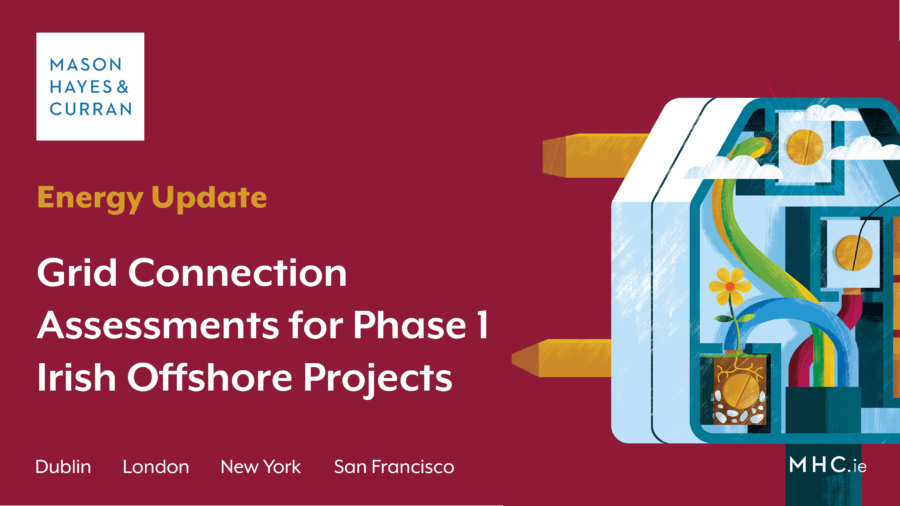
The Commission for Regulation of Utilities (CRU), Ireland’s energy regulator, has set out the basis on which Ireland’s “Phase One” offshore energy projects shall move through the next stages of the process of establishing connections to the Irish electricity transmission system.
The Phase One projects are a closed set of early-mover Irish offshore energy projects, each of which had already advanced under the Foreshore Act 1933. They then satisfied the definition of “relevant maritime usage” under Section 100 of the Maritime Area Planning Act when this was enacted in late 2021.
Scope of Grid Connection Assessments
The CRU has decided that in the next stage of the process for Phase 1 connection applications, and provided that each applicant has confirmed that it continues to seek a grid connection, EirGrid (Ireland’s electricity transmission system operator) will develop and issue a “Grid Connection Assessment” (GCA) to each Phase 1 applicant. This will likely be based on the grid connection assessments already published by EirGrid in 2021. EirGrid’s target is to issue the GCA within 90 days after the connection application is deemed complete.
As part of the “application confirmation” stage:
- Each applicant is required to submit a single desired level of Maximum Export Capacity applicable to its project, in MW. This is a refinement of the range that it was permitted to submit in a previous round of dealings with EirGrid, although the new amount can be no greater than the upper limit of that range.
- Each applicant is required to agree its onshore connection point with EirGrid. If there is competition for onshore connection points, “collaborative agreement between the parties” is required, and in the absence of agreement, onshore connection points are to be assigned by EirGrid based on prescribed “offshore node assignment criteria”.
The GCA will then detail the connection method and cost of connecting the Phase 1 project to the transmission system at the relevant onshore connection point.
Why are GCAs needed?
An offshore project will require a GCA in order to:
- Participate in a support scheme auction. Phase 1 projects are likely to require support under one of the tranches of Ireland’s Renewable Electricity Support Scheme that is reserved for participation by offshore projects. The Department of Environment, Climate and Communications (DECC) is currently considering the results of a consultation that it launched in October 2021 on the terms of a first offshore RESS auction (ORESS 1). The CRU states repeatedly in its decision paper that the main purpose of the GCA process is to “ready all Phase 1 projects for the ORESS 1 auction in order to provide sufficient volume and competition in that auction”. Accordingly, it is expected, and reflects the starting position under the DECC consultation, that it will be necessary to hold a GCA in order to participate in ORESS 1.
- Qualify for a full grid connection offer, incorporating a legally binding connection agreement. The connection policy underlying the full grid offer will be the subject of separate CRU consultation.
Conclusion
The confirmation of the Grid Connection Assessment regime by the CRU is an important development in the race to develop the Irish offshore from a renewable energy perspective.
Assuming they are able to navigate the GCA process successfully, Ireland’s Phase 1 offshore projects will be able to demonstrate to interested parties that there is a firm basis upon which they can structure their ORESS 1 bid and expect to eventually receive a connection offer to the Irish grid. This is particularly important, given that it is the developers themselves that are expected to construct the offshore connection assets.
For more information on the GCA process and on all other aspects of Ireland’s new offshore consenting regime, contact a member of our Energy team.
The content of this article is provided for information purposes only and does not constitute legal or other advice.






